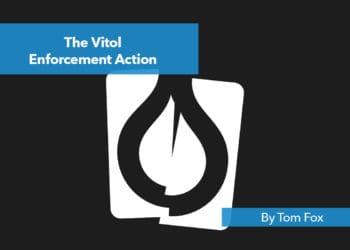Commission Prepares to Implement Self-Reporting Program
The Director of the Division of Enforcement at the Commodity Futures Trading Commission (CFTC) noted recently that the Division’s role is “to facilitate healthy, robust and resilient markets” to deter misconduct. To that end, the Division plans to implement a cooperation and self-reporting program as a way of getting buy-in from the communities and markets it polices.
with co-authors Michael Brooks, Bob Pease and Jennifer Gordon
On September 25, 2017, James McDonald, Director of the Division of Enforcement (Division) at the Commodity Futures Trading Commission (CFTC or Commission) gave a speech at New York University in which he discussed the mission of the Division of Enforcement and revealed a new framework for policing financial markets.[1] McDonald noted that the Division of Enforcement’s role is “not to bring enforcement actions for their own sake,” but rather “to facilitate healthy, robust and resilient markets” with the “ultimate goal” being to “deter misconduct in these markets.” Recognizing these goals and that it is not enough to wait for violations to occur, for the CFTC to detect them and then to prosecute them, McDonald explained that the Division of Enforcement plans to implement a cooperation and self-reporting program as a way of getting buy-in from the communities and markets it polices.
Whether a company will self-report potential violations “often comes down to a business decision — to dollars and cents,” according to McDonald. Therefore, in order to shift toward an enforcement system favoring cooperation and self-reporting, the Division will offer “substantial benefit” to self-reporters in the form of significantly reduced penalties for violations. In order to be eligible for the “benefit” of reduced penalties, a company must voluntarily report wrongdoing to the Division. Such disclosure must be truly voluntary, or in McDonald’s words — “it must be made before an imminent threat of disclosure or of a government investigation.” Also, the disclosure must be done promptly after discovery and openly and fully describe the misconduct. In order to incentivize prompt disclosure, the Division will give full credit when a company diligently attempts to determine the relevant facts at the outset, fully discloses them, continues to investigate and discloses later-discovered relevant facts as it becomes aware of them.
In addition to requiring voluntary, prompt and complete disclosure of the misconduct, in order to get full cooperation and self-reporting credit, a company must continue proactively to fully cooperate with the Division throughout any subsequent investigation. Such continuing cooperation may require disclosure of specific facts related to the involvement of specific individuals. McDonald did not go into detail regarding what actions are required or expected of entities engaged in “continuing cooperation.” Depending on the Division’s expectations, continued cooperation could be costly and time-consuming for a company or individual. Further, it is unclear whether the investigation initiated by the CFTC after a self-report will be just as adversarial in nature as a typical investigation, or whether there will be more room for negotiation regarding the scope and resources required to respond to witness deposition requests, document production requests, etc. Finally, in addition to continued cooperation, a company also must “timely and appropriately remediate” the misconduct in such a way to ensure that it does not occur again. McDonald noted that this may mean implementing or fixing compliance and internal controls programs.
If a company self-reports and cooperates in the manner McDonald outlined, the Division will commit to outlining its expectations at the outset, working with the company on remediation and providing “concrete benefits in return” in the form of a recommendation of a “substantial reduction in the penalty that otherwise would be applicable” or the Division may even “declin[e] to prosecute a case.” McDonald did not elaborate on or quantify what was meant by “substantial reduction” or which exceptional cases would be subject to a declination. However, just this past June, the Commission entered into its first non-prosecution agreement with three traders, providing some insight into the types of cases that might be eligible for these benefits. Although the CFTC had penalized and fined the traders’ employer (a large investment banking and financial advisory services company) and two of its other traders earlier in the year, the Commission treated differently the three traders that were considered extremely cooperative. The Commission noted these traders’ “timely and substantial cooperation, immediate willingness to accept responsibility, material assistance to CFTC’s investigation of [their employer] and the absence of a history of prior misconduct.” At the time, McDonald noted:
Non-prosecution agreements like these give the Division a powerful tool to reward extraordinary cooperation in the right cases while providing individuals and organizations strong incentives to promptly accept responsibility for their wrongdoing and cooperate with the Division’s investigation. For many types of complex cases, there is simply no substitute for cooperating witnesses, who can tell the inside story of the fraud or misconduct at issue. Used properly, this type of first-hand knowledge can help the Division identify more culpable wrongdoers, hold them accountable and further protect customers and the integrity of the markets. That’s exactly what happened here: These traders readily admitted their own wrongdoing, identified misconduct of others and provided other valuable information, all of which expedited our investigation and strengthened our cases against the other wrongdoers.[2]
The movement toward a program of self-reporting and cooperation aligns with similar programs implemented by other agencies. For example, the penalty guidelines set forth by the Federal Energy Regulatory Commission (FERC) for violations of its statutes and regulations offer significant reductions to penalty levels for self-reporting, cooperation and acceptance of responsibility.[3] FERC believes that “giving organizations credit for prompt reporting of violations increases compliance by providing an incentive for, and increasing the likelihood of, early detection of violations.”[4] Similar to the program outlined by McDonald for the CFTC Division of Enforcement, FERC requires disclosures be made without unreasonable delay or threat of disclosure/investigation, that cooperation be done in good faith, consistently and continuing throughout an entire investigation and that responsibility be accepted and remediation implemented. FERC utilizes these factors, amongst others, to implement a points system for calculating credits against proposed penalties. The Securities Exchange Commission (SEC) and the Department of Justice (DOJ) similarly encourage wrongdoers to self-report and cooperate in exchange for reduced penalties or non-prosecution. The SEC has long had an informal cooperation program which it first formalized in 2001 in the so-called “Seaboard Report”[5] and then modified over the years. In 2010, the SEC issued a policy statement articulating a framework for evaluating cooperation by individuals in the Commission’s investigations and actions, which the SEC Division of Enforcement considered “a potential game-changer.”[6] The SEC’s program provides for different types of agreements with cooperating entities and individuals, including cooperation agreements (agreeing to recommend certain reduced charges or penalties), deferred prosecution agreements and non-prosecution agreements. In September 2015, the Deputy Attorney General of the DOJ, Sally Yates, issued a memo regarding the agency’s focus on individual accountability for corporate wrongdoing (the Yates Memo), which clarified that under the Principles of Federal Prosecution of Business Organizations, in order to be eligible for “cooperation credit,” corporations “must provide to the Department all relevant facts about the individuals involved in corporate misconduct.”[7]
It remains to be seen exactly how the CFTC will implement its new program and how it will differ from similar programs currently implemented by the other enforcement agencies, but McDonald made clear that the goal is not to offer “get out of jail free card[s]” — even with self-reporting, the Division will still investigate the reported misconduct to establish the scope and exact nature of the wrongdoing. And to the extent a company chooses not to self-report, it can expect to be “met with vigorous, aggressive prosecution, accompanied by full monetary penalties.”
[1] Speech of James McDonald, Director of the Division of Enforcement Commodity Futures Trading Commission Regarding Perspectives on Enforcement: Self-Reporting and Cooperation at the CFTC (Sept. 25, 2017), available at http://www.cftc.gov/PressRoom/SpeechesTestimony/opamcdonald092517.
[2] CFTC Press Release No. PR7581-17 (June 29, 2017), available at http://www.cftc.gov/PressRoom/PressReleases/pr7581-1.
[3] Enforcement of Statutes, Orders, Rules and Regulations, Docket No. PL10-4-000, Revised Policy Statement on Penalty Guidelines, 132 FERC ¶ 61,216 (Sept. 17, 2010).
[4] 132 FERC ¶ 61,216 at P 127.
[5] Report of Investigation Pursuant to Section 21(a) of the Securities Exchange Act of 1934 and Commission Statement on the Relationship of Cooperation to Agency Enforcement Decisions, Securities Exchange Commission Release No. 34-44969 (Oct. 23, 2001) (“Seaboard Report”), available at http://www.sec.gov/litigation/investreport/34-44969.htm.
[6] SEC Announces Initiative to Encourage Individuals and Companies to Cooperate and Assist in Investigations, Securities Exchange Commission Release 2010-6 (Jan. 13, 2010), available at https://www.sec.gov/news/press/2010/2010-6.htm.
[7] Individual Accountability for Corporate Wrongdoing, Memorandum to All United States Attorneys from Sally Quillian Yates, U.S. Department of Justice (Sept. 9, 2015), available at https://www.justice.gov/archives/dag/file/769036/download.



 David Perlman is a Partner in Bracewell LLP’s energy practice in Washington, D.C. David represents and counsels clients in regulatory and compliance matters concerning the Federal Energy Regulatory Commission, Commodity Futures Trading Commission and state public utility commissions, energy-related transactions and financings, and in the establishment of compliance programs and training. His clients include utilities, commodities merchants, oil and gas pipeline companies, electric generators, energy marketers, industrial customers, generators, lenders and financial institutions, and oil & gas producers. He can be reached at
David Perlman is a Partner in Bracewell LLP’s energy practice in Washington, D.C. David represents and counsels clients in regulatory and compliance matters concerning the Federal Energy Regulatory Commission, Commodity Futures Trading Commission and state public utility commissions, energy-related transactions and financings, and in the establishment of compliance programs and training. His clients include utilities, commodities merchants, oil and gas pipeline companies, electric generators, energy marketers, industrial customers, generators, lenders and financial institutions, and oil & gas producers. He can be reached at 






